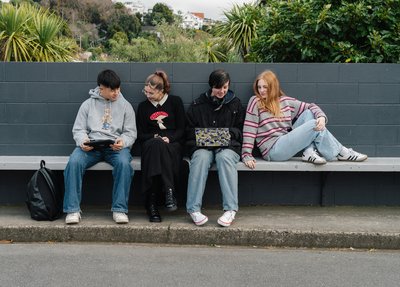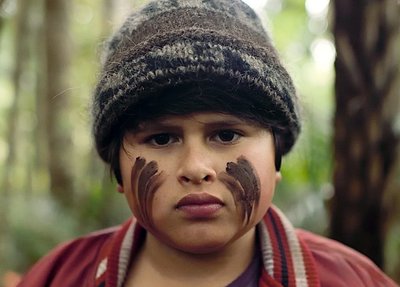
Feeling lonely and the dangers of the internet
Caitlin on Oct. 31, 2022
For decades films and series show young people running to their room, yelling at their parents and slamming the door. The problem was never about the parents but something the young person was going through at the time. They would write in their diary, sneak out the window with friends or a boy, or they would simply lie on their bed – feeling the overwhelming weight of their emotions. The hard challenge today is that when they slam the door to their room they’re now not alone. In fact there is the entire internet waiting for them.
Caitlin is one of our Youth Facilitators – she plays a key role in engaging with rangatahi and getting their perspectives on movies, shows, games and other content they’re exposed too. In 2021 the Office released a research report on the growing spread of misinformation, ‘The Edge of the Infodemic’. We are concerned about how rangatahi are being manipulated online and want to empower and encourage parents to engage with their whānau on the dangers of the online world as much as possible.
For decades films and series show young people running to their room, yelling at their parents and slamming the door. The problem was never about the parents but something the young person was going through at the time. They would write in their diary, sneak out the window with friends or a boy, or they would simply lie on their bed – feeling the overwhelming weight of their emotions. The hard challenge today is that when they slam the door to their room they’re now not alone. In fact there is the entire internet waiting for them.
Feeling lonely and misunderstood is something we have all experienced at some point in our lives. It is hard to talk about, easy for others to brush off and can hold us as prisoners. While this feeling can affect all ages this blog is about feeling lonely as a young person and the role the online world plays.
Seeking validation online is not a new concept and we have seen how this has shaped the toxicity of social media platforms and the effect this has on rangatahi today. While how we and others perceive our ‘online-selves’ is important to kōrero about, there are other really challenging obstacles to navigate when it comes to the darkness of the wide web.
Where there is loneliness there are people who wait in the shadows who will try to take advantage of those who are suffering. We have all heard of grooming, but the different purposes, methods and outcomes of grooming has definitely developed and will keep changing as the internet continues to evolve.
This year, both globally and here in Aotearoa, we have seen a rise in sextortion situations with rangatahi. This is where people fall into a relationship with someone they have never met. They are eventually asked to send money or intimate visual recordings (nudes) and then are blackmailed into sending more. Our friends over at Netsafe warn for and have advice around different types of romance or sextortion scams and see this as a huge threat for our rangatahi. Overseas there are cases where young people have felt so pressured and trapped in this kind of scam where it has resulted in them taking their own life.
Increased during the lockdowns, we have also seen a rise in misinformation, radicalisation and online misogyny. Young people are growing as a group who are a main target of this type of manipulation and hatred, especially our boys. Feeling lonely, angry and frustrated with the outside world where no one understands you makes it easy to be a target and a tool. People like Andrew Tate and online extremism platforms validate, recruit and take advantage of unhappy young people, which can result in them committing both online and offline harm.
As a parent there is nothing more soul-crushing than hearing your pēpi is unhappy. When they are young it is easy to identify and offer help when they aren’t okay. As they get older young people seem to not talk as much or want to let us in.
Our biggest advice is to be as engaged as possible – probably to the point where you really are that annoying parent. And that is okay - it’s cool to be an uncool parent! Here is a list of articles offering help and advice for whānau and rangatahi in navigating these very real online harms.
- Police warn of rise in 'sextortion' cases involving young victims – RNZ
- ROMANCE SCAMS – Netsafe
- UNDERSTANDING FAKE SEXTORTION EMAIL SCAMS – Netsafe
- The Bare Facts – Netsafe
- How to protect our boys from misogynistic internet rabbit holes where people like Andrew Tate lurk – Stuff
It is that time of year where the holidays are on the horizon and as much as they want a break from homework, assignments and exams, school is the main link for rangatahi to their friends, a routine and critical thinking. While school is out take this opportunity to talk with your rangatahi and kōrero about loneliness and some of these hard-hitting issues.
Remember not to be the disengaged parents we see on-screen who avoid thee tricky topics with their young people and find out with everyone else what is going on when it is too late.
Further reading:
Subscribe to our blog
Stay up to date with the Classification Office blog.


